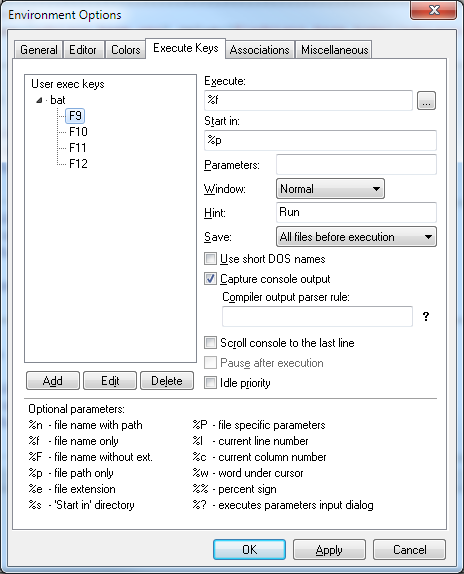
| Previous | Next | Printer friendly |
ConTEXT
ConTEXT is a simple, powerful, open source text editor for Windows.

ConTEXT is designed to make it easy to edit source code of various forms, such as program code, HTML or configuration files. Its main features are:
- You can edit multiple files in multiple tabs.
- It automatically maintains a manageable list of recently opened files, allowing you to jump in and out of a set of related files with ease. You can set bookmarks in files, to easily find your way around them.
- It has features to help editing code, such as automatic indent, block indent and comment/uncomment.
- It supports different editing options, such as what characters to use at the end of a line, or whether to use tabs or spaces for indents.
- It has tools for common editing tasks, such as a compare tool and sort, which means you do not have to leave the tool to perform these.
- It has configurable syntax highlighters, which give you many more visual clues to the code you are editing. Highlighters for many different types of code can be downloaded for free.
One of the most useful features of ConTEXT are the execute keys and user commands. These allow external programs to be executed when you press a key or one of the buttons on the toolbar.

I use this with simple batch files to run all my compilations and test directly from ConTEXT.
What I really like about ConTEXT is that it is very simple indeed. If you have ever used any Windows program before, you will be able to use ConTEXT straight away. It has all the features you really need to edit code, but it is not bloated with a whole load of unnecessary stuff. It is a small, well-behaved executable with no particular setup requirements.
There are, of course, much more advanced integrated development environments (IDEs), which offer many more features, in addition to editing and basic tools. Many people find IDEs really useful. Personally, I have never found IDEs easy to work with – they are too hard to set up, there is too much to learn, and they hide what is really going on. ConTEXT does everything that I need, and for the past five years I have used it for the vast majority of my development work. But even if you do use an IDE, ConTEXT provides a very good secondary tool for occasional tasks that your IDE can not support so simply.
Choice of editor bring out strong feelings amongst programmers, and we can be fiercely loyal to the tools we use. If you are happy with the editors you use, then I am not trying to convert you to ConTEXT. However, if you have any involvement in software development of any kind, and you do not have a good general-purpose editor, then you really should get to know ConTEXT.
Next: Postmodern ITSubscription
Latest newsletter:
Magical metadata
We use the term "metadata-driven" to describe IT solutions in which functionality is defined in data. Taking this to the extreme can provide unparalleled levels of speed, simplicity and versatility.
Read full newsletter
System governance
System governance helps you implement high-quality systems, manage existing systems proactively, and improve failing systems.
Copyright © 2005-2015 Minimal IT Ltd. All rights reserved.
Minimal IT: research, training, consultancy and software to reduce IT costs.
